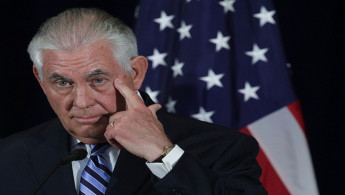US: Gulf row will 'not impact war on terror'
US Secretary of State Rex Tillerson called on Gulf states to stay united and work out their differences after several nations cut diplomatic ties with Qatar on Monday.
The US official said "we certainly would encourage the parties to sit down together and address these differences".
"If there's any role that we can play in terms of helping them address those, we think it is important that the GCC [Gulf Cooperation Council] remain united."
In the region's most serious diplomatic spat in years, Qatar's Gulf neighbours Riyadh, Bahrain and the United Arab Emirates as well as Egypt and other Arab nations all announced they were severing ties with Doha.
Riyadh cut diplomatic relations and closed borders with its neighbour to "protect its national security from the dangers of terrorism and extremism", the official Saudi Press Agency said.
A Saudi-led coalition which for more than two years has been fighting Iran-backed rebels in Yemen separately announced Qatar was no longer welcome in the alliance, accusing it of supporting terrorist organisations.
Yemen welcomed the move and also followed in the footsteps of its Gulf backers, severing ties with Doha.
On Sunday, Qatar announced six of its military personnel had been injured in Yemen "defending the southern border of the Kingdom of Saudi Arabia".
Tillerson said he did not expect the impasse to have "any significant impact, if any impact at all, on the unified fight against terrorism in the region or globally".
"All of those parties you mentioned have been quite unified in the fight against terrorism and the fight against [IS], and have expressed that most recently in the summit in Riyadh," he added.
Qatari authorities expressed "great surprise" over what it described as the recent unjustified developments in the region just hours after Saudi Arabia published its decision, creating a domino effect in the region.
In a statement published by Qatar's foreign ministry, authorities said the decision, which it claims was clearly pre-meditated, "is based on baseless fabricated claims".
Those taking part in the anti-Qatar movement have accused Doha of "supporting terrorism" - an allegation it strongly denies.
"Qatar has been the target of a systematic incitement campaign that promoted outright lies, which indicates that there was a prior intent to harm the state," the statement said.
Tensions have been escalating for more than two weeks, with a media-fuelled campaign apparently coordinated by the highest levels of Gulf leadership.
Less than a month ago, US President Donald Trump visited the region to cement ties with powerhouse Saudi Arabia - the first foreign stop of his young presidency.
In a Riyadh speech to Muslim leaders from around the world, Trump urged them to "drive out" extremists and "terrorists".
Follow us on Twitter: @the_newarab





 Follow the Middle East's top stories in English at The New Arab on Google News
Follow the Middle East's top stories in English at The New Arab on Google News
![The UAE is widely suspected of arming the RSF militia [Getty]](/sites/default/files/styles/image_330x185/public/2024-11/GettyImages-472529908.jpg?h=69f2b9d0&itok=Yauw3YTG)
![Netanyahu furiously denounced the ICC [Getty]](/sites/default/files/styles/image_330x185/public/2024-11/GettyImages-2169352575.jpg?h=199d8c1f&itok=-vRiruf5)
![Both Hamas and the Palestinian Authority welcomed the ICC arrest warrants [Getty]](/sites/default/files/styles/image_330x185/public/2024-11/GettyImages-2178351173.jpg?h=199d8c1f&itok=TV858iVg)